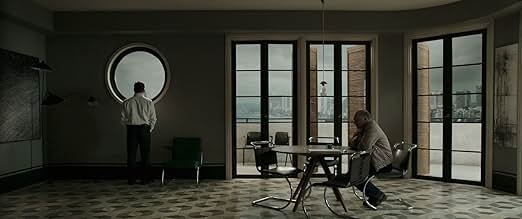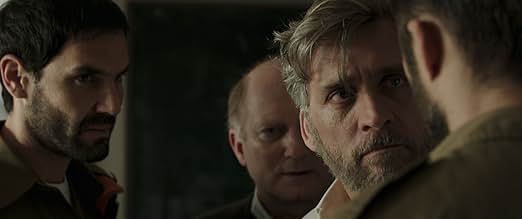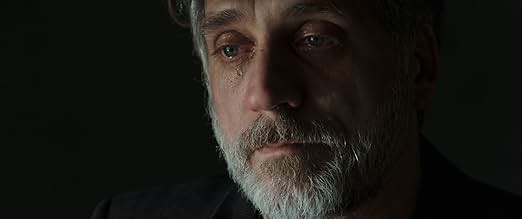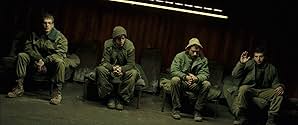VALUTAZIONE IMDb
7,2/10
8296
LA TUA VALUTAZIONE
Una famiglia con non pochi problemi è costretta ad affrontare la situazione quando qualcosa va terribilmente storto alla desolata postazione militare del figlio.Una famiglia con non pochi problemi è costretta ad affrontare la situazione quando qualcosa va terribilmente storto alla desolata postazione militare del figlio.Una famiglia con non pochi problemi è costretta ad affrontare la situazione quando qualcosa va terribilmente storto alla desolata postazione militare del figlio.
- Regia
- Sceneggiatura
- Star
- Premi
- 21 vittorie e 25 candidature totali
Yonatan Shiray
- Jonathan
- (as Yonathan Shiray)
Itay Exlroad
- Dancer Soldier
- (as Etay Axelroad)
Arie Tcherner
- High Ranking Officer
- (as Aryeh Cherner)
Recensioni in evidenza
This highly acclaimed drama from Israel is a thoughtful and deep reflection on how we perceive of the scars that grief and guilt can leave on us. The film follows a patriarch and his wife who are told at the beginning of the film by Israeli army officers that their son was killed in the line of duty. These two parents begin to embark on a seemingly hellish grieving process...for the first 30 minutes. I won't give away what happens next, but the film ends up taking a variety of unique twists and turns through three distinct parts similar to that of a triptych-style narrative. It's not quite what you think it is, that's for sure.
The acting in the film is consistently excellent, particularly the performance of the father. He manages to engage the audience in his seething feelings of sadness and an almost-primal sensation of rage, while still feeling uniquely down-to-earth and relatable. This is an almost impossible trick to pull off. Samuel Maoz clearly knows how to write thoughtful analysis of the society and people of Israel, with a clockwork level of precision--and props to him for that. The pacing in the film's three acts, however, could have been improved and can feel somewhat erratic in the movie's second half. Additionally, the finale of the movie is done in a somewhat peculiar manner that falls a bit short of what would most satisfy the viewer in terms of wrapping up the story. Still, I definitely recommend "Foxtrot" to those interested and thought this was quite a well-made film at the end of the day. 7.5/10
The acting in the film is consistently excellent, particularly the performance of the father. He manages to engage the audience in his seething feelings of sadness and an almost-primal sensation of rage, while still feeling uniquely down-to-earth and relatable. This is an almost impossible trick to pull off. Samuel Maoz clearly knows how to write thoughtful analysis of the society and people of Israel, with a clockwork level of precision--and props to him for that. The pacing in the film's three acts, however, could have been improved and can feel somewhat erratic in the movie's second half. Additionally, the finale of the movie is done in a somewhat peculiar manner that falls a bit short of what would most satisfy the viewer in terms of wrapping up the story. Still, I definitely recommend "Foxtrot" to those interested and thought this was quite a well-made film at the end of the day. 7.5/10
'Foxtrot' begins with a woman, Dafna (Sarah Adler), opening her front door, seeing who is on the doorstep and immediately fainting. Moments later her husband Michael (Lior Ashkenazi, possibly Israel's busiest actor) is told by three members of the Israel Defence Forces (IDF) that his and Dafna's son Jonathan has been killed on military service. The IDF take over everything, arranging the funeral, dispensing sedatives to Dafna and setting alarms on Michael's telephone to remind him to drink every hour. Then the scene shifts and we are at Jonathan's lonely desert outpost, where the soldiers - when not sleeping and eating in a slowly-sinking shipping container - man a grubby checkpoint used most regularly by an unaccompanied camel. A final scene change brings us back to Dafna and Michael on what would have been Jonathan's twentieth birthday.
I found the middle and final segments the most interesting: although not a lot happens at the checkpoint, the segment set there is an interesting study on how boys from comfortable middle-class backgrounds cope when handed guns and forced to live in squalor. The bereaved parents' conversation in the third segment, in which we see how their loss has affected their relationship, is terribly bittersweet. By contrast, the first segment has a curiously episodic feel to it that may be intended to convey how Michael stumbles through the hours immediately after learning of his son's death, but I found rather jarring. On the whole, though, this slow-moving film is well worth watching.
I found the middle and final segments the most interesting: although not a lot happens at the checkpoint, the segment set there is an interesting study on how boys from comfortable middle-class backgrounds cope when handed guns and forced to live in squalor. The bereaved parents' conversation in the third segment, in which we see how their loss has affected their relationship, is terribly bittersweet. By contrast, the first segment has a curiously episodic feel to it that may be intended to convey how Michael stumbles through the hours immediately after learning of his son's death, but I found rather jarring. On the whole, though, this slow-moving film is well worth watching.
I've been expecting to see faster happenings in the movie, but no, I did not. As one drama, it is good in those segments where you can follow the main character's expressions, but on the other hand it is a bit boring because he is not the only character in it and almost all the rest are unconvincing actors. From time to time a director gives us pieces of black humor and that intention drives us not to be rigorous in giving comments. It is specifically in those scenes with four soldiers in shipping container, that is slowly sinking into the muck, and in which they are located to be while guarding the border. The best two things of the movie are those shots made from above and that little cartoon where we can see the story about what happened in the past and why. From my point of view, it is worth seeing, but it is not the perfect masterpiece as we wanted to see.
The theme 'war is absurd' has become a cliché that tests the creativity of many a filmmaker. How many ways can you represent the random chaos of shattered lives and senseless destruction? The emotional rollercoaster Foxtrot (2017) hits the high-watermark in originality for the way it deploys grief, social critique, and absurdism to show a different side of war.
The film's four acts defy the conventions of linear storytelling. In the opening seconds, a mother (Sara Adler) sees three soldiers at the door and before they can speak she collapses to the ground. With military precision, the doctor among them administers sedation and tells the father (Lior Askhkenazi) she will sleep for five hours; that's usual, they say. When a son has fallen in the line of duty they expect the father to cope. They leave; another comes to plan just another funeral; then alone, the father furiously paces like a caged beast, crushed by his own emotions. In five hours they return with totally different news.
That plotline alone could fill a movie, but it is merely the first step of an absurdist dance with chaos that goes forward, across, back, then returns to the beginning. In the second act we meet the very much alive son Jonathan (Yonaton Shiray) who is stationed on an isolated checkpoint where the only intruders are camels that have trained the guards to open the boom-gate to let them pass. Bored out of their minds, the four teenage warriors tell each other stories, punctuated by Jonathan's memorable foxtrot dance with his rifle as partner. The third and final acts complete this case study of random chaos; they include a scene one year later where the mother and father commiserate a tragedy and a dissolving marriage. The final seconds of the film match the opening in the way they erupt with the unexpected.
Undoubtedly, this film is anchored by the first 45 minutes in which Lior Askhkenazi gives a tour-de-force performance of going to hell and back. It is also a forensic satire that is beyond war clichés and that has infuriated the Israeli Military establishment. So much is being said in this film, with so few words spent. Small moments are jarring: like a father being told casually that his fallen son was promoted posthumously, as if he is worth more dead than alive, or the mechanically detailed way the military deals with death and bereavement. The camerawork and colour palette superbly set the mood of each act, and the asymmetry of the narrative reflects an alternative and absurdist universe in which war is normalised.
This is powerful cinema, the kind that can sweep you up with its characters, emotions, and story. Then, at the end of the film when the dance is done, you are left in disbelief at the banality of humanity. Watch for Foxtrotin Best Foreign Film award.
The film's four acts defy the conventions of linear storytelling. In the opening seconds, a mother (Sara Adler) sees three soldiers at the door and before they can speak she collapses to the ground. With military precision, the doctor among them administers sedation and tells the father (Lior Askhkenazi) she will sleep for five hours; that's usual, they say. When a son has fallen in the line of duty they expect the father to cope. They leave; another comes to plan just another funeral; then alone, the father furiously paces like a caged beast, crushed by his own emotions. In five hours they return with totally different news.
That plotline alone could fill a movie, but it is merely the first step of an absurdist dance with chaos that goes forward, across, back, then returns to the beginning. In the second act we meet the very much alive son Jonathan (Yonaton Shiray) who is stationed on an isolated checkpoint where the only intruders are camels that have trained the guards to open the boom-gate to let them pass. Bored out of their minds, the four teenage warriors tell each other stories, punctuated by Jonathan's memorable foxtrot dance with his rifle as partner. The third and final acts complete this case study of random chaos; they include a scene one year later where the mother and father commiserate a tragedy and a dissolving marriage. The final seconds of the film match the opening in the way they erupt with the unexpected.
Undoubtedly, this film is anchored by the first 45 minutes in which Lior Askhkenazi gives a tour-de-force performance of going to hell and back. It is also a forensic satire that is beyond war clichés and that has infuriated the Israeli Military establishment. So much is being said in this film, with so few words spent. Small moments are jarring: like a father being told casually that his fallen son was promoted posthumously, as if he is worth more dead than alive, or the mechanically detailed way the military deals with death and bereavement. The camerawork and colour palette superbly set the mood of each act, and the asymmetry of the narrative reflects an alternative and absurdist universe in which war is normalised.
This is powerful cinema, the kind that can sweep you up with its characters, emotions, and story. Then, at the end of the film when the dance is done, you are left in disbelief at the banality of humanity. Watch for Foxtrotin Best Foreign Film award.
'Foxtrot' starts with officers telling Michael and Daphna Feldman their son Jonathan has been killed in the line of fire.
The film then spends quite a bit of time showing us how they battle to come to terms with the loss of their son. For a while, the film stagnates on their emotions, with some scenes lingering. The lack of musical score makes it all the more realistic and the actors does such a great job that we believe they actually lost a loved one.
Funeral arrangements are being made whilst the film still focuses heavily on Michael's emotions. If you're tempted to stop watching after this slow start, don't! In an instant, the film changes direction with an unexpected reveal. How do I even talk about 'Foxtrot' without doing spoilers? I want you to be just as surprised as I was and revealing what happens next will ruin the surprise.
But the film is not done with shock reveals. Just when you think everything is on track, 'Foxtrot' suddenly resorts to non-linear storytelling - another element I never saw coming that changes everything!
'Foxtrot' features fantastic performances, great cinematography, and a few moments that reminded me of a Wes Anderson film. A Few moments even had me laughing out loud! This is a very unusual film. It has a very simple premise, but it is so well executed. Oh, but that ending...
The film then spends quite a bit of time showing us how they battle to come to terms with the loss of their son. For a while, the film stagnates on their emotions, with some scenes lingering. The lack of musical score makes it all the more realistic and the actors does such a great job that we believe they actually lost a loved one.
Funeral arrangements are being made whilst the film still focuses heavily on Michael's emotions. If you're tempted to stop watching after this slow start, don't! In an instant, the film changes direction with an unexpected reveal. How do I even talk about 'Foxtrot' without doing spoilers? I want you to be just as surprised as I was and revealing what happens next will ruin the surprise.
But the film is not done with shock reveals. Just when you think everything is on track, 'Foxtrot' suddenly resorts to non-linear storytelling - another element I never saw coming that changes everything!
'Foxtrot' features fantastic performances, great cinematography, and a few moments that reminded me of a Wes Anderson film. A Few moments even had me laughing out loud! This is a very unusual film. It has a very simple premise, but it is so well executed. Oh, but that ending...
Lo sapevi?
- QuizAccording to Samuel Maoz, the film was conceived as three episodes: The first sequence should shock and shake, the second should hypnotize, and the third should be moving.
- ConnessioniReferences Chi ha incastrato Roger Rabbit (1988)
- Colonne sonoreNever Been
Performed by Betzefer
I più visti
Accedi per valutare e creare un elenco di titoli salvati per ottenere consigli personalizzati
- How long is Foxtrot?Powered by Alexa
Dettagli
Botteghino
- Lordo Stati Uniti e Canada
- 618.883 USD
- Fine settimana di apertura Stati Uniti e Canada
- 31.629 USD
- 4 mar 2018
- Lordo in tutto il mondo
- 1.356.159 USD
- Tempo di esecuzione
- 1h 53min(113 min)
- Colore
- Mix di suoni
- Proporzioni
- 2.35 : 1
Contribuisci a questa pagina
Suggerisci una modifica o aggiungi i contenuti mancanti


















